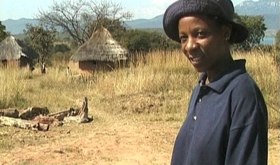Forbidden Fruit
| Movie | |
|---|---|
| German title | Forbidden Fruit |
| Original title | Forbidden Fruit |
| Country of production |
Germany , Zimbabwe |
| original language |
English , Shona |
| Publishing year | 2000 |
| Rod | |
| Director | Beate Kunath , Sue Maluwa Bruce, Yvonne Zückmantel |
| script | Beate Kunath, Sue Maluwa Bruce, Yvonne Zückmantel |
| production | Beate Kunath, Sue Maluwa Bruce |
| music | Martine Felton |
| camera | Beate Kunath |
| cut | Beate Kunath |
| occupation | |
| |
Forbidden Fruit is a semi-documentary short film by Beate Kunath , Sue Maluwa Bruce and Yvonne Zückmantel. He was awarded the Teddy Jury Prize at the 51st Berlinale in 2001 .
action
The two young women Nongoma and Tsitsi live in a village in rural Zimbabwe. Tsitsi is married. They fall in love, but their secret affair is revealed and Nongoma is forced to flee to town. Tsitsi's family is convinced that they are possessed by an evil spirit and subject them to an exorcism by a traditional healer. Two years later, after a long period of separation without contact, the two women meet again in Mutare.
production
Forbidden Fruit was filmed on location in Mutare . When the original cast resigned for fear of homophobic reactions, Maluwa Bruce cast friends and family members. The script was changed and Maluwa Bruce took part as the narrator, who holds the plot together with a retrospective narrative frame.
criticism
Nicole Blizzard from Technodyke called the film “wonderful”, for Amy Villarejo from Cornell University it is “a moving call for queer, global solidarity”. PlanetOut called it "the bravest film shown at the Berlinale" and Daniel Somerville commented: "It may not be the best film ever made, but it certainly pioneers the Zimbabwean context".
Awards
- 2001 51st Berlin International Film Festival , Teddy Jury Prize
- 2001 15th International Lesbian & Gay Film Festival Bologna, Special Jury Mention
- 2001 Identities , Queer Film Festival Vienna - Femmedia Award, Best Short Film
further reading
- Martin P. Botha: Queering African Film Aesthetics: A Survey from the 1950s to 2003 . In: Nwachukwu Frank Ukadike (Ed.): Critical Approaches to African Cinema Discourse . Lexington Books, Lanham 2014, ISBN 978-0-7391-8093-8 , p. 84.
Web links
- Forbidden Fruit in the Internet Movie Database (English)
- Forbidden Fruit at filmportal.de
- Forbidden Fruit in the online movie database
- Chemnitz film workshop
- Forbidden Fruit on the homepage of Beate Kunath
- Forbidden Fruit film data sheet of the Berlinale 2001
Individual evidence
- ↑ Sebastian Schneller: Alternative film award: Techno thunderstorm after the gala. In: tagesspiegel.de. February 18, 2001, accessed June 22, 2020 .
- ^ Forbidden Fruit. In: berlinale.de. Retrieved June 27, 2020 .
- ↑ a b Forbidden Fruit. In: bk-productions.de. Retrieved June 27, 2020 .
